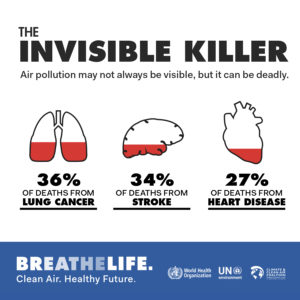Meeting the objectives of the Paris Climate Change Agreement by investing in low emissions technology would save governments around USD 54 trillion in health care costs by 2050, including those associated with polluted air.
That’s the conclusion of a study published in the Lancet Planetary Health, which found that investing in the reduction of greenhouse gas emissions would be much cheaper than paying the health costs associated with polluted air while also resulting in millions fewer premature deaths.

The UN is stepping up efforts to fight air pollution and climate change through international efforts such as the Paris Climate Change Agreement and via campaigns such as BreatheLife
The report also outlines basic climate policy options which would have an immediate and positive impact both on the health and economies of the world’s societies.
“Removing fossil fuel subsidies and implementing carbon taxes could, if properly designed, improve health, reduce greenhouse gas emissions, redistribute wealth, and stimulate employment.”
~ Authors of Health co-benefits from air pollution and mitigation costs of the Paris Agreement: a modelling study
In an article on the report by the UNFCCC, Dr. Phillip J Landrigan, an American epidemiologist and a leading advocate for children’s health, responding to the findings of the Lancet Commission’s Report on Pollution and Health: “The good news is that ambient air pollution can be controlled and the diseases it causes prevented. Ambient air pollution is not the unavoidable consequence of modern economic growth…Cities and countries will need to switch to non-polluting energy sources, encourage active commuting, enhance their transportation networks, redesign industrial processes to eliminate waste, and move away from the resource-intensive so-called take-make-use-dispose model of economic growth towards a clean, sustainable, circular economic model.”
Read the full article by the United Nations Climate Change here, and the study here.
For a sense of how air pollution impacts the human body, watch the latest illustrative WHO videos here.